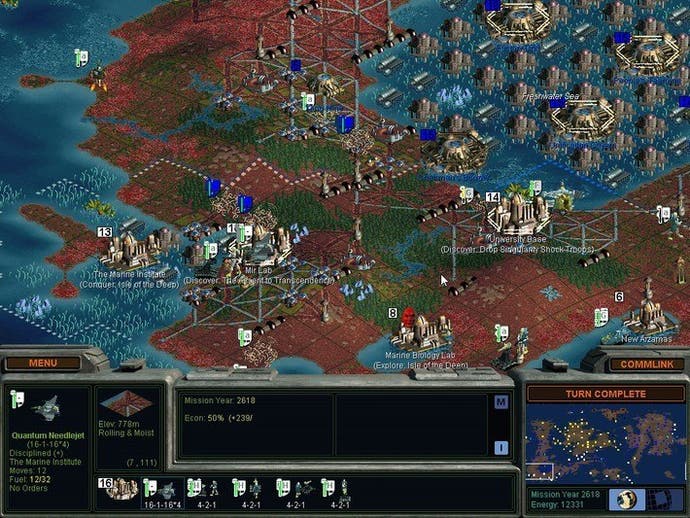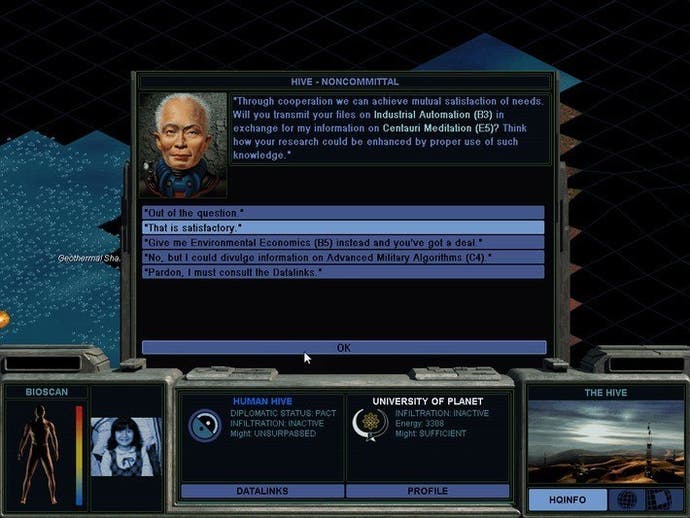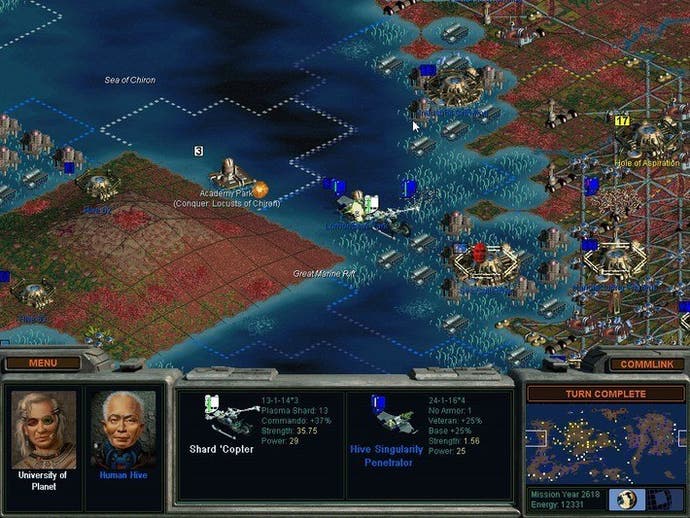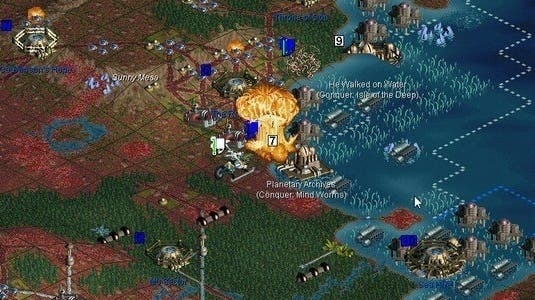On two decades of Sid Meier's Alpha Centauri
Happy birthday, Planet!
Fascists, communists, eco-warriors and the remnants of the old world's liberal order violently squabble for humanity's future on a planet trying to kill them. The gulf widens between the haves and have-nots as long-lived Talents lord over toiling Drones kept in line by mass entertainment and police brutality. Artificial intelligences see everything, even into dreams, as humans become more like machines and machines become ever more like gods.
Twenty years ago last February, Sid Meier's Alpha Centauri challenged players to make a new home for humankind around our nearest star. Beginning where Civilization 2's space race victory left off, SMAC represented a completely new direction. Freed from Earth's gravity, the game combined sci-fi horror and wild utopian possibilities with innovative mechanics and engrossing story. Yet the most interesting thing about SMAC is that it acknowledges and even embraces the moral implications of the 4X genre. Where Civilization has often strived to put a cute gloss over the cold machinery of progress, Alpha Centauri asks what that gloss hides. In many ways it feels like the beginning of a conversation mainstream games are still reluctant to have.
From the moment your faction's escape pod crashes to the surface of an alien world, SMAC emphasises your fragility on this unknown frontier. Gone are the green fields and snow-capped mountains of Earth. This world, known only as Planet, is covered in red dust, smothering fungus, dense jungle and lethal mindworms. Between this hostile landscape, the sparse soundtrack, and the isolation from the other six factions you know are out there, SMAC tells you this isn't civilisation. This is survival.
By the time your technology has advanced enough to terraform the new world, it feels earned, clawed from the teeth of an environment utterly resistant to your intrusion. The native fungus will bloom and spread at random, choking farms and concealing hidden packs of mindworms that home in on vulnerable settlements. But plant some Earth trees and, in the peculiar conditions of Planet, they will soon turn invasive and spread to create vast forests. Planet's prevailing wind blows eastward, so by elevating the terrain you can create ridges that capture rain on one side and leave desert on the other - potentially an act of war, if your rain shadow covers your neighbour. The coastline can be altered to form land bridges or defensive channels. Few 4X games allow players so much control over the environment. Fewer still show the consequences as well. Invasive forests can be inconvenient; excessive pollution risks mindworm attacks in greater numbers and rising sea levels as the climate boils over. Absent 15 years in Civilization and most of its imitators - only recently reintroduced in Gathering Storm - climate is a crucial part of SMAC's living world.

Seven factions vie for control of that world. Despite their functional similarities, each represents a different vision for humanity's future, with an immediately intelligible concept: Gaia's Stepdaughters are environmentalist pseudo-mystics; the Spartan Federation are might-makes-right survivalists; Morgan Industries stands for unbridled capitalism. Ideologies are reflected in baroque city names like He Walked On Water, Cosmograd, Seat of Proper Thought, Last Rose of Summer. And, of course, each faction has its leader.
These are the real stars of Alpha Centauri. The Civ series is known for its cartoon representations of national leaders, but they are just that - cartoons, somewhere between emperor and mascot. Alpha Centauri's are complex characters with motives and histories, and the game places you firmly in their shoes. Instead of being an ephemeral representation of a people, you are Lady Deirdre of the Gaians or Chairman Yang of the Hive, kept alive through the centuries by longevity tech. Whoever you pick, the others leaders are omnipresent, on and off the world map. New discoveries, base facilities, and secret projects come with voiced quotes, usually from one of the seven faction leaders, that flesh out the world of Alpha Centauri. Brief snippets of lore expand on their character and worldview of the leaders, and provide context for your new discoveries. Deirdre, the environmental scientist, shares her wonder at Planet's native ecosystems or her philosophical conversations with the gestalt consciousness of Planet itself, but reveals every now and then a disturbing comfort with psychic warfare. Lal's reports on human rights are intermingled with his melancholy personal reflections. Miriam, Bible-thumping theocrat, is also a perceptive social theorist, often right about the dangers of technology. Many of the voice actors are from the same country as their character, and they lend a distinct personality to their quotes that becomes familiar, even comforting, like old friends. As the tech tree marches on, their stories, the story of their societies, and their possible fates are hinted at in snapshot.
This kind of storytelling is now common, and Alpha Centauri wasn't the first to do it by any means. But the brevity and often the beauty of the writing is still impressive, especially in a strategy game, where the player is usually at such a remove. It's closer to the piecemeal narratives of Sunless Sea or Cultist Simulator than the more staid pop-ups of Stellaris. At turns philosophical, informative, or poetic, the Datalinks breathe life into the cold business of statecraft. Launch an orbital hydroponics lab, and Deirdre's melodic voice describes their strange beauty: "life-giving stars on a desolate planet, gardens on the wing." Build one of the earliest facilities, the innocent-sounding recycling tanks, and Sheng-ji Yang reveals "It is every citizen's final duty to go into the tanks and become one with all the people."

SMAC is full of these Wait, what did I just build? moments. The world you're making is not necessarily a happy one. The game won't punish you for creating a nightmare. Some factions might judge; most won't, especially if you repeal the UN charter. But more than any other 4X game I've ever played, SMAC wants you to think about what kind of society you wish to create.
What surprised me when I returned to the game recently is how often it talks about ethics. From the opening cutscene, where the seven factions divide "not by nationality, but by ideology, and their vision for the new world", the human soul is identified as a terrain of conflict. When you select a faction, the first thing you see isn't their stats, but a statement of their philosophy. Social breakthroughs are accompanied by quotes from Aristotle, St Augustine, Plato, Lao Tzu and others discussing what it means to build the good society. Other discoveries hint at the unintended consequences of progress, as Lal notes the thoughtless destruction of native environments by oblivious human settlers, or Yang boasts that his genetically engineered slave-workers feel no pain.
When playing Civilization, I think nothing of building a few death robots and stomping on my neighbours. In Alpha Centauri, I steadfastly avoid Punishment Spheres, Genejack Factories, or nerve-stapling rioting drones. Even as the science goes from near-future plausibility to crystal spires and togas, even as the ethical systems of Planet mutate from traditions rooted in Earth's past to ever more distant philosophies, the descriptions of these technological terrors gives me pause.

Alpha Centauri isn't self-consciously a 'message game'. It doesn't feel like Bioshock or Spec Ops: The Line, where I'm punished for following the rules supplied. Nobody will know but me. Nobody on the dead Earth will ever know what their far-flung children become. It's simply that, in a way that is still unfortunately rare outside of indie titles, Alpha Centauri has a basic interest in ethics and a willingness to confront its own implications with some measure of honesty. It acknowledges the imperatives of the genre while nonetheless suggesting that the true victory is not winning the battle for Planet but transcending it.
Planet is a bleak, lonely world, where the last remnants of humanity are most likely doomed to repeat their worst mistakes, to spread death and devastation even to the stars. But Alpha Centauri never gives up hope in the possibility of breaking the cycle. As your faction transitions from a frontier society to something truly new, exploring Planet's mysteries reveals that it, too, has been repeating through the millennia, its dormant hive mind almost reaching sentience before collapsing again into oblivion. Ultimately, you can choose to merge with the vast collective consciousness of Planet, transcending humanity and becoming something altogether new. Or you can crown yourself king on the last living rock in the universe.
"You are orphans, your homeworld already buried so young among the aeons. Yet now you fill the skies where we watched a million sunsets with flame and contrails, paying no heed to the hard lessons the universe has tried to teach you. Are you a breath of life to invigorate a complacent world, you earthhumans, or an insidious cancer which must be excised?"

